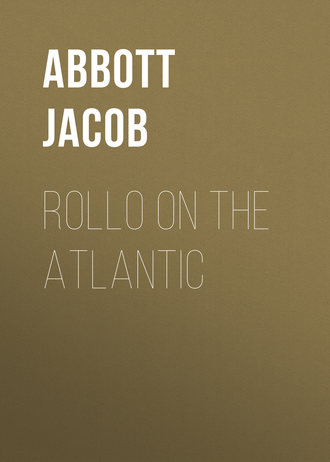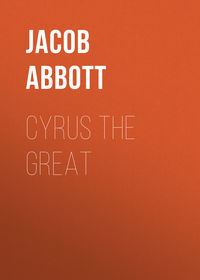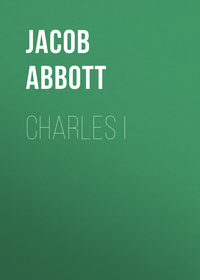
Rollo on the Atlantic
This second method consists of actually measuring the progress of the ship through the water, by an instrument called the log and line. The log—which, however, is not any log at all, but only a small piece of board, loaded at one edge so as to float upright in the water—has a long line attached to it, which line is wound upon a light windlass called a reel. The line, except a small portion of it at the beginning is marked off into lengths by small knots made in it at regular intervals. There are little rags of different forms and colors tied into these knots, so that they may easily be seen, and may also be distinguished one from the other.
When the time comes for performing the operation of heaving the log, as they call it, the men appointed for the purpose bring the log and the reel to the stern of the ship. One man holds the log, and another man the reel. There are two handles, one at each end of the reel, by which the man who serves it can hold it up over his head, and let the line run off from it. Besides the two men who hold the log and the reel, there is a third, who has a minute glass in his hand. The minute glass is like an hour glass, only there is but just sand enough in it to run a minute. The man who has the minute glass holds it upon its side at first, so as not to set the sand to running until all is ready.
At length the man who holds the log throws it over into the water, and the ship, sailing onward all the time, leaves it there, floating edge upwards. The man who holds the reel lifts it up high, so that the line can run off easily as the ship moves on. As soon as the first rag runs off, which denotes the beginning of the marked point of the line, he calls out suddenly,—
"Turn!"
This is the command to the man who holds the minute glass to turn it so as to set the sand to running. He accordingly instantly changes the position of the glass, and holds it perpendicularly, and immediately sets himself to watching the running out of the sand. The instant it is gone, he calls out,—
"Stop!"
The man who is holding the reel, and another who stands by ready to help him, instantly stop the line, and begin to draw it in. They observe how many knots have run out, and they know from this how many miles an hour the ship is going. Each knot goes for a mile.
They do not have to count the knots that have run out. They can always determine, by the form and color of the last one that passed, what knot it is. One of the men goes immediately and reports to the captain that the ship is going so many knots, and the captain makes a record of it. The other men at once begin to draw in the line, which brings the log in also at the end of it. This line comes in very hard, for the friction of so long a cord, dragged so swiftly through the water, is very great. It generally takes four or five men to pull the line in. These men walk along the deck, one behind the other, with the line over their shoulders; and at first they have to tug very hard. The reel man winds the line upon the reel as fast as they draw it in. It comes in more and more easily as the part that is in the water grows shorter; and at length the log itself is soon skipping through the foam in the wake of the ship, until it comes up out of the water and is taken on board.
They heave the log every two hours,—that is, twelve times for every twenty-four hours,—and from the reports which the captain receives of the results of those trials, it is easy for him to calculate how far the ship has come during the whole period. As he knows, too, exactly how far the pilot has been steering by the compass all this time, he has both the direction in which the ship has been sailing, and the distance to which she has come; and, of course, from these data he can calculate where she must now be. This mode of determining the ship's place is called by the reckoning. The other is called by observation.
The intelligent and reflecting boy who has carefully read and understood the preceding explanations will perceive that the two operations which we have been describing are in some sense the reverse of each other. By the former, the navigator ascertains by his measurements where the ship actually is to-day, and then calculates from that how far, and in what direction, she has come since yesterday. Whereas, by the latter method, his measurements determine directly how far, and in what direction, the ship has come; and then he calculates from these where she now is. Each method has its advantages. The former, that by observation, is the most sure and exact; but then it is not always practicable, for it may be cloudy. On the other hand, the latter—that is, by the reckoning—never fails, for the log can always be thrown, be the weather what it may; but it cannot be fully relied upon, on account of the currents in the water and the drifting of the vessel. Consequently, on board all ships they keep the reckoning regularly every day. Then, if they get a good observation, they rely upon that. If they do not, they go by the reckoning.
We now return to the story. And here, I suppose, is the place where those sagacious children, who, when they are reading a book in which entertainment and instruction are combined, always skip all the instruction, and read only the story, will begin to read again, after having turned over the leaves of this chapter thus far, seeing they contain only explanations of the mode of navigating a ship, and saying nothing about Hilbert and Rollo. Now, before going any farther, I wish to warn all such readers, that they will not be able to comprehend at all clearly the complicated difficulties which Hilbert and the others got into in respect to the lottery without understanding all that has been explained in the preceding pages of this chapter. I advise them, therefore, if they have skipped any of it, to go back and read it all, and to read it slowly too, and with the utmost attention. And I advise them, moreover, if they do not perfectly understand it all, to ask some older person to read it over with them and explain it to them. If they are not willing to do this, but insist on skipping the first part of the chapter, I advise them to make complete work of it, and skip the last half too; for they certainly will not understand it.
When Hilbert went back to the paddle box with his half sovereign, it was about eleven o'clock. The observation was to be made at twelve; and the results, both in respect to the observation and the reckoning, were to be calculated immediately afterward. The lottery which the men were making related to the number of miles which the ship would have made during the twenty-four hours. The men were just making up the list of subscribers to the tickets when Hilbert went up to them. He gave his half sovereign to the man who had the list. This man whom they called the Colonel, took the money, saying, "That's right, my lad," and put it in a little leather purse with the other half sovereigns.
"What's your name, Bob?" said he.
"Livingston," said Hilbert.
"Bobby Livingston," said the Colonel, writing down the name on his list.
"No," said Hilbert, contemptuously, "not Bobby Livingston. Hilbert Livingston."
"O, never mind," said the Colonel; "it's all the same thing. Bobby means boy."
The plan of the lottery was this: It was generally supposed that the ship's run would be about 270 miles; and it was considered quite certain, as has already been stated, that it would not be more than 280, nor less than 260. So they made twenty tickets, by cutting five of the Colonel's visiting cards into quarters, which tickets were to represent all the numbers from 261 to 280, inclusive. They wrote the numbers upon these cards, omitting, however, the first figure, namely, the 2, in order to save time; for as that figure came in all the numbers, it was considered unnecessary to write it. When the numbers were written thus upon the cards, the cards themselves were all put into a cap2 and shaken up, and then every one who had paid a half sovereign drew out one, the colonel holding the hat up high all the time, so that no one could see which number he drew. This operation was performed in the midst of jokes and gibes and loud shouts of laughter, which made the whole scene a very merry one. When Hilbert came to draw, the merriment was redoubled. Some called on the Colonel to hold down the cap lower, so that Bob could reach it. Others said that he was sure to get the lucky number, and that there was no chance at all for the rest of them. Others, still, were asking him what he would take for his ticket, or for half of it, quarter of it, and so on. Hilbert was half pleased and half ashamed at being the object of so much coarse notoriety; while Rollo, who had drawn up toward the place, and was looking on from a safe distance as the proceedings that were going on, was very glad that he was not in Hilbert's place.
The ticket that Hilbert drew was marked 67. It denoted, of course, the number 267; and that, being pretty near to the number of miles which it was thought the ship would probably make, was considered quite a valuable ticket. The owners of the several tickets, as soon as the drawing was completed, began to compare them and talk about them, and to propose bargains to one another for buying and selling them, or exchanging them. In these negotiations each man was endeavoring to outwit and circumvent his friend, in hopes of buying his ticket for a moderate sum, and drawing the whole prize with it. Others were engaged in betting on particular tickets. These bets, when they were made, they recorded in little memorandum books kept for the purpose. In fact, a very noisy and tumultuous scene of bargaining, and betting, and barter ensued.
Hilbert was very much pleased with his ticket. He went to show it to Rollo. He said he verily believed that he had got the exact ticket to draw the prize. He did not think the ship would go quite 270 miles.
"And if she does not," said he, "and should happen to go only 267 miles, then I shall have ten pounds; and that is almost fifty dollars."
So saying, Hilbert began to caper about the deck in the exuberance of his joy.
His antics were, however, suddenly interrupted by the Colonel, who just then came up to him and asked to see his ticket. Hilbert held it up so that the Colonel could see the number upon it.
"Sixty-seven," said the Colonel. "That is not worth much. Nobody thinks she'll go less than 270. However," he added, in a careless tone, "I'll give you twelve shillings for it. That is two shillings over what you paid for it—nearly half a dollar.3 You'd better make sure of half a dollar than run the risk of losing every thing on such a poor ticket as that."
"Would you?" said Hilbert, turning to Rollo.
"I don't know," replied Rollo, shaking his head. "I don't know any thing about it."
"No," said Hilbert, turning to the Colonel again; "I believe I will keep my ticket, and take my chance."
The Colonel said, "Very well; just as you please;" and then went away. Hilbert had, after this, several other offers, all which he declined; and in about a quarter of an hour the Colonel met him again, as if accidentally, and began to talk about his ticket. He said that all the tickets under 270 were selling at a low price, as almost every body believed that the ship's run would be more than that; but still, he said, he would give a pound for Hilbert's ticket, if he wished to sell it. "Thus," said he, "you'll get back the half sovereign you paid, and another half sovereign besides, and make sure of it."
But the more the people seemed to wish to buy Hilbert's ticket, the less inclined he was to part with it. So he refused the Colonel's offer, and put the card safely away in his wallet. In one sense he was right in refusing to sell his chance; for as the whole business of making such a lottery, and buying and selling the tickets afterward, and betting on the result, is wrong, the less one does about it the better. Every new transaction arising of it is a new sin. It could easily be shown, by reasoning on the philosophy of the thing, why it is wrong, if there were time and space for it here. But this is not necessary, as every man has a feeling in his own conscience that there is a wrong in such transactions. It is only bad characters, in general, that seek such amusements. When others adventure in them a little, they make apologies for it. They say they are not in the habit of betting, or of venturing in lotteries, or that they don't approve of it—but will do it this once. Then, when people lose their money, the chagrin which they feel is always deepened and imbittered by remorse and self-condemnation; while the pleasure which those feel who gain is greatly marred by a sort of guilty feeling, which they cannot shake off, at having taken the money of their friends and companions by such means. All these indications, and many others which might be pointed out, show that there is a deep-seated and permanent instinct in the human heart which condemns such things; and nobody can engage in them without doing violence to this instinct, and thus committing a known wrong.
In regard to most of the men who were engaged in the lottery, they had so often done such things before that their consciences had become pretty well seared and hardened. There was one man, however, who decided to take a ticket against considerable opposition that was made to it by the moral sentiments of his heart. This was Maria's brother. He had been confined to his berth most of the voyage, but was now better; and he had been walking up and down the deck with a friend. He looked pale and dejected, however, and seemed still quite feeble.
His friend, whom he called Charles, seeing that they were going on with a lottery near the paddle boxes, proposed that they should both go and buy tickets.
"Come," said he, "Chauncy, that will amuse you."
"O, no," said Mr. Chauncy.
"Yes, come," said Charles. "Besides, we ought to do our part to assist in entertaining one another."
So saying, Charles led Mr. Chauncy along, and partly by persuasion, and partly by a little gentle force, he made him take out his purse and produce a half sovereign, too. He also subscribed himself, and then drew both the tickets. He gave one of them to Mr. Chauncy, and the other he kept himself; and then the two friends walked away. Mr. Chauncy's ticket was 66, the number immediately below that which Hilbert had drawn.
Mr. Chauncy, being now tired of walking, went to sit down upon one of the settees next to where Hilbert and Rollo had just gone to take a seat. Mr. Chauncy was next to Hilbert. He immediately began to talk with Hilbert about the lottery.
"Have you got a ticket in this lottery?" he asked.
"Yes," said Hilbert; "mine is 267. What is yours?"
"I don't know," said Mr. Chauncy; "I did not observe." As he said this, however, he took his ticket out of his pocket, and said, reading it, "Ninety-nine."
He was holding it wrong side upward, and so it read 99.
"Ho!" said Hilbert, "that will not get the prize. We shall not go 299 miles. I would not exchange mine for yours on any account."
"No," said Mr. Chauncy, "nor would I exchange mine for yours."
"Why?" said Hilbert. "Do you think there is any chance of the ship's making 299?"
"No," replied Mr. Chauncy; "and that is the very reason I like my ticket. If I had yours, I should be afraid I might get the prize."
"Afraid?" repeated Hilbert.
"Yes," said Mr. Chauncy.
"Why should you be afraid?" asked Hilbert, much surprised.
"Because," said Mr. Chauncy, "I should not know what to do with the money. I would not put it in my purse; for I don't let any thing go in there but honest money. I don't know who I could give it to. Besides, I should not like to ask any body to take what I should be ashamed to keep myself. I should really be in a very awkward situation."
As he said this, Mr. Chauncy held his ticket between his thumb and finger, and looked at the number. Neither he nor Hilbert suspected for a moment that there was any mistake in reading it; for, not having paid any attention to the scheme, as it is called, of the lottery, they did not know how high the numbers went.
"There is a possibility that I may get it, after all," said Mr. Chauncy at length, musing. "We have had fine weather, and have been coming on fast. The best thing for me to do is to get rid of the ticket. Have you got a ticket, Rollo?" said he, turning to Rollo.
"No, sir," said Rollo.
"I have a great mind to give it to you, then."
"No, sir," said Rollo; "I would rather not have it."
"That is right," said Mr. Chauncy. "I like you the better for that. I know what I will do with it. Do you remember an Irishwoman that you see sitting on the forward deck sometimes with her two children?"
"Yes," said Rollo; "she is there now."
"Very well," said Mr. Chauncy; "carry this to her, and tell her it is a ticket in a lottery, and it may possibly draw a prize. Have you any conscientious scruples about doing that?"
"No, sir," said Rollo.
"Then take the ticket and go," added Mr. Chauncy. "Tell her she had better sell the ticket for two shillings, if she gets a chance. There may be somebody among the gamblers that will buy it."
So Rollo took the ticket and carried it to the Irishwoman. She was a woman who was returning to Ireland as a deck passenger. She was quite poor. When Rollo tendered her the ticket, she was, at first, much surprised. Rollo explained the case fully to her, and concluded by repeating Mr. Chauncy's advice—that she should sell the ticket, if she could get a chance to sell it for as much as two shillings. The woman, having been at sea before, understood something about such lotteries, and seemed to be quite pleased to get a ticket. She asked Rollo to tell such gentlemen as he might meet that she had 99 to sell for two shillings. This, however, Rollo did not like to do; and so he simply returned to the settee and reported to Mr. Chauncy that he had given the woman the ticket and delivered the message.
Mr. Chauncy said he was very much obliged to him; and then, rising from his seat, he walked slowly away, and descended into the cabin.
Chapter X.
The End of the Lottery
In almost all cases of betting and lotteries, the operation of the system is, that certain persons, called the knowing ones, contrive to manage the business in such a way, by secret manœuvres and intrigues, as to make the result turn out to their advantage, at the expense of those parties concerned who are ignorant and inexperienced, or, as they term it, "green." Very deep plans were laid for accomplishing this object in respect to the lottery described in the last chapter; though, as it happened in this case, they were fortunately frustrated.
The principal of these manœuvres were the work of the man whom they called the Colonel. He had formed the plan, with another man, of secretly watching the operation of heaving the log every time it was performed, and making a note of the result. By doing this, he thought he could calculate very nearly how many miles the ship would make, while all the other passengers would have nothing to guide them but such general estimates as they could make from recollection. He accordingly arranged it with his confederates that one or the other of them should be on deck whenever the men were called to heave the log, and, without appearing to pay any particular attention to the operation, carefully to obtain the result, and make a memorandum of it. This plan was sufficient for the daytime. For the night—inasmuch as it might excite suspicion for them to be up at unseasonable hours to watch the operation—they resorted to another method. They bribed one of the seamen of each watch to find out the result of each trial during his watch, and to give them the answers in the morning. When the last time for heaving the log, previous to making up the accounts for the day, came, which was at ten o'clock, they took that result, and then, shutting themselves up in their state room, they made a calculation, and ascertained pretty certainly, as they thought, that the distance would be about 267 miles. It might possibly be 266, or 268; but they thought that they were sure that it would be one of those three numbers. The next thing was to circulate statements, and to express opinions in private conversation here and there among the passengers, in a careless sort of way, to produce a general impression that the rate of the ship would be not less than 270 miles. This was to lead the owners of the tickets, and the betters generally, not to attach a high value to the numbers below 270. By doing this, they expected to depress the value of these tickets in the general estimation, so that they could buy then easily. They calculated that, if their plans succeeded, they could buy 266, 267, and 268 for about a sovereign apiece—the holders of them being made to suppose, by their manœuvres that those numbers would have very little chance of obtaining the prize.
The plan was very deeply laid, and very skilfully executed; and the men were so far successful in their efforts that they did produce a general impression that the ship's run could not be below 270. They also bought ticket 268, though they had to give two sovereigns for it. It has already been shown how their attempts to get possession of 267 failed, by Hilbert's refusal to sell it. They of course also failed to get 266, for that ticket was not to be found. They could not make any very open and public inquiries for it, as it was necessary that every thing which they did should be performed in a very unconcerned and careless manner. They, however, made repeated inquiries privately for this ticket but could not get any tidings of it. A certain sailor told some of the betters that an Irishwoman on the forward deck had a ticket which she offered to sell for two shillings; but when, on being asked what the number was, he answered 99, they laughed at him, supposing that somebody had been putting a hoax upon the poor Irishwoman, as there was no such number as that in the lottery.
Besides the manœuvres of these two confederates, there was another man who was devising a cunning scheme for obtaining the prize. This was the mate of a merchant ship that had put into the port of New York in a damaged condition, and had there been sold. The mate, being thus left without a vessel, was now returning as a passenger in the steamer, to Scotland, where he belonged.
This man was accustomed to navigation; and he had the necessary books for making the computations in his trunk. He conceived the idea of being present on deck at twelve o'clock, when the captain made his observation, and of learning from him, as it were accidentally, what the sun's altitude was observed to be. This he could very easily do, for it was customary to have the observation made not only by the captain, but by one or two of the chief officers of the ship also, at the same time, who are all always provided with sextants for the purpose. The results, when obtained, are compared together, to see if they agree—each observer telling the others what altitude he obtains. Thus they are more sure of getting the result correctly. Besides, it is important that these officers should have practice, so that they may be able to take the observation when the captain is sick, or when they come to command ships themselves.
Now, the mate above referred to thought that, by standing near the captain and his officers when they made the observations, he could overhear them in comparing their results, and then that he could go down into his state room immediately; and that there, by working very diligently, he could ascertain the run of the ship before it should be reported on the captain's bulletin, and so know beforehand what ticket would gain the prize. Or, if he could not determine absolutely what the precise ticket would be,—since his computation might not agree precisely with that made by the captain,—he could determine within two or three of the right one, and then buy three tickets—that is, the one which agreed with his calculation, and also the one above and below it—for perhaps a sovereign or so apiece: he would thus get the ten sovereigns by an expenditure of three or four. His plan, in fact, was similar to that of the Colonel; only his estimate was to be based on the observation, while that of the Colonel was based on the dead reckoning. They both performed their computations in a very skilful manner, and they came to nearly the same result. The mate came to the conclusion that the run of the ship would be 266 miles; while the Colonel, as has already been stated, made it 267. While, therefore, the Colonel, to make sure of the prize, wished to buy tickets 266, 267, and 268, the mate wished to secure 265, 266, and 267. The mate, after making some inquiry, found who had 265; and, after some bargaining, succeeded in buying it for two sovereigns and a half. But he could not hear any thing of 266. As for 267, he discovered that Hilbert had it, just as the bell rang for luncheon. He told Hilbert that if he wished to sell his ticket he would give him thirty shillings for it, which is a sovereign and a half. But Hilbert said no.









